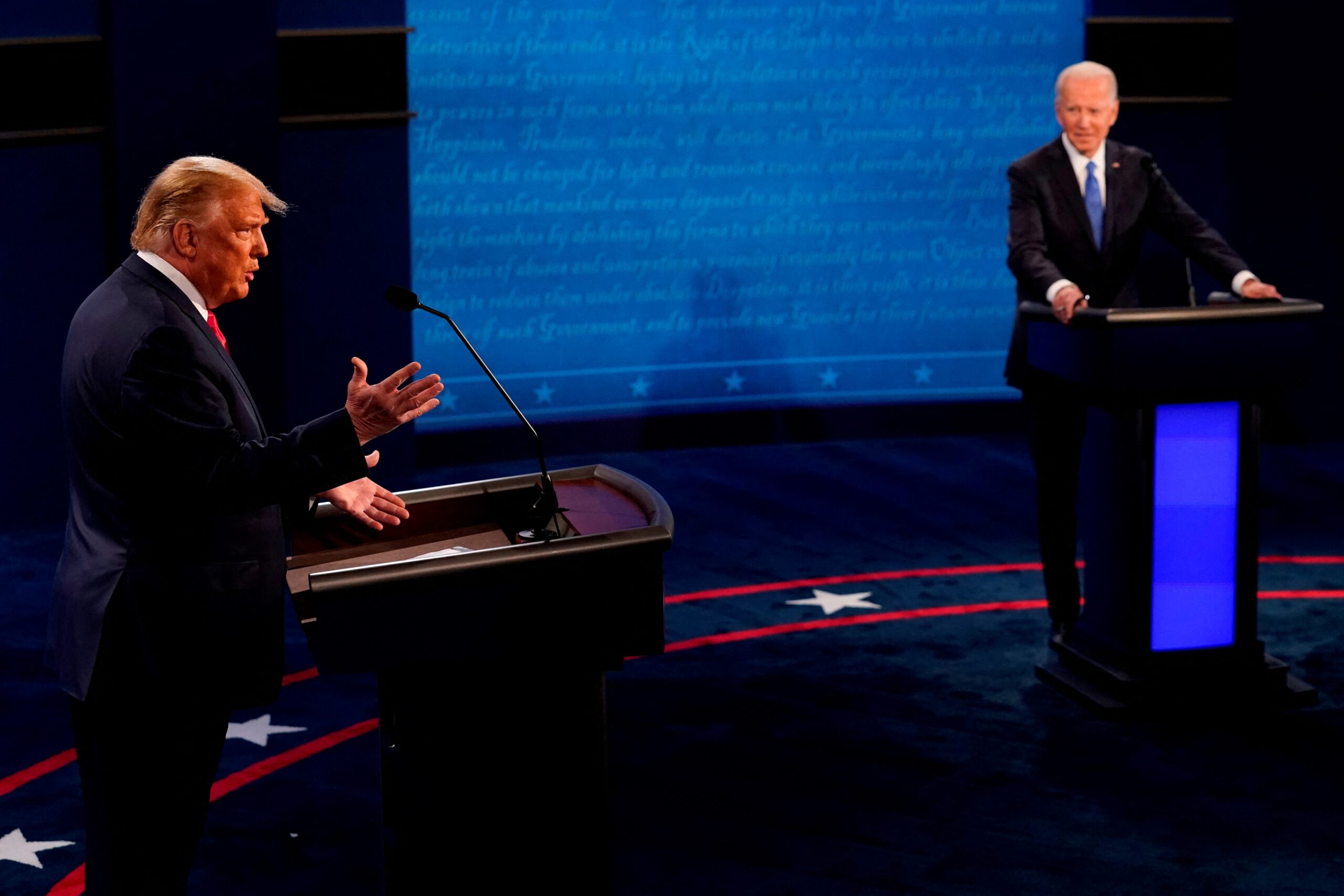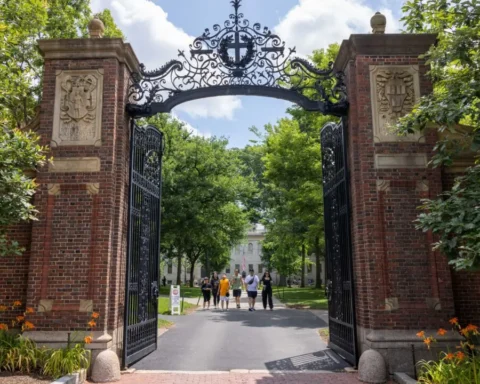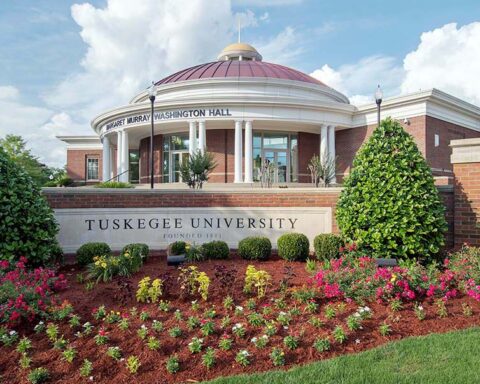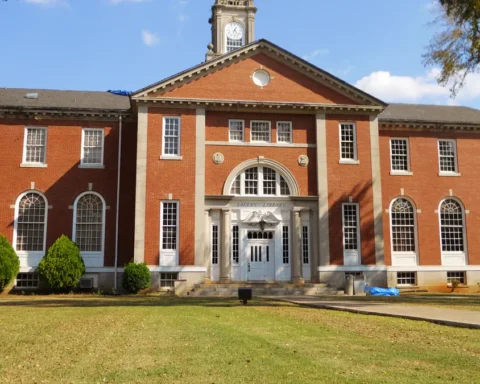By Bob Moser
For an industry that employs four million Americans and attempts to educate 15 million more, higher education is, strangely, routinely ignored in presidential elections. Every four years, higher ed types wonder if this will turn out to be the long-awaited “higher ed election.” And every November, they realize that aside from some jibes at “woke” students and the occasional proposal for free community college or Title IX reform, the topics that matter to colleges and universities barely came up at all.
But there’s hope for 2024, though not for the best of reasons. Skepticism of a college degree’s value has risen to the level of a public relations crisis. The post–Oct. 7 unrest that roiled some campuses turned them—and their students and faculty—into convenient political objects of loathing and derision for populist Republicans and invited congressional investigations into their handling of antisemitism charges. The rise in state control over public universities bubbled up in the primary, in the form of Florida governor Ron DeSantis, and even Donald Trump declared that “firing the accreditors”—an unlikely wedge issue if ever there was one—would be his “secret weapon” for winning back the White House.
Meanwhile, President Biden has struggled to make good on his promises to undo Trump’s Title IX reforms and push through mass student loan forgiveness. At the same time, he’s alienated many young voters—who could well decide the election in closely contested swing states—with his staunch backing of Israel. And both candidates, aiming to win over Black voters, have boasted about how much they’ve done for HBCUs.
That’s a lot of fodder for a debate. But it doesn’t scratch the surface of the challenges colleges and universities are confronting. For starters, how can a college education be affordable, offer equitable opportunity without affirmative action and remain relevant to the emerging economy?
The debate moderators, try as they might, won’t get to all the important questions the present and former presidents should have to answer tonight. So we asked a range of higher ed leaders, thinkers, reformers and skeptics what they’d ask Biden, Trump or both candidates if CNN magically handed them the microphone.
Here are some of their sharpest questions, edited for clarity and concision. Now, we’d all like some answers.
Rotua Lumbantobing
Vice president, American Association of University Professors, and professor at Western Connecticut State University
The U.S. has a world-class public education system, but states’ divestment in public universities has resulted in higher tuition rates, worsening racial inequalities and preventing many from a path of upward mobility. How can we maintain and extend excellence in public higher education while making college and university affordable for a broad swath of U.S. society?
David Wippman
President of Hamilton College
President Biden, you have proposed a range of measures to make higher education affordable, from loan forgiveness to expanding Pell Grants. Yet a majority of Americans now question whether higher education is worth the cost. What is the proper role of the federal government in ensuring that all qualified students can get a college education without incurring a crushing burden of debt, and what role, if any, should the government play in limiting tuition increases?
Michelle Dimino
Director of education at Third Way
Nearly 40 million Americans started college but never completed a degree. This contributes to financial struggles faced by borrowers and their families, losses on taxpayer dollars, and an undertrained workforce to meet economic needs—but it’s almost never talked about nationally. What do you believe the federal role is in stemming the college completion crisis, and what steps will your administration take to increase graduation rates and decrease college dropout rates nationwide?
Paulette Granberry Russell
President of the National Association of Diversity Officers in Higher Education
At least 85 bills have been introduced in 28 states and the U.S. Congress that would limit or outright ban programs and practices that encourage diversity, equity and inclusion in public education (secondary and postsecondary). Do you believe these bans on DEI initiatives affect this country’s social values, its commitment to equality and equity, and democracy?
Fanta Aw
Executive director and CEO of NAFSA: Association of International Educators
International students are major contributors to their campuses, communities, cities and the nation. Yet unlike other countries, the U.S. does not have a national strategy to attract and retain them. Many international students, upon completion, return home to contribute and become important bridge builders for the United States. Those who choose to remain in the U.S. help foster innovation and help grow the economy by contributing their skills and knowledge. As president, what policies would you put in place to welcome international students to the U.S., and for those who wish to contribute to the economy postgraduation, would you consider putting in place measures to streamline employability?
Rotua Lumbantobing
Excessively long wait times for visas, including student visas and visas for short-term research visits and conferences, mean that fewer foreign students are able to come to the United States. U.S. scholars and students have fewer opportunities to interact with their counterparts from abroad. What steps can the federal government take to ensure that the United States’ broken immigration system does not cut U.S. researchers and students off from crucial interactions with their counterparts abroad?
Ryan Craig
President Trump: As a result of anti-immigration policies enacted during your term, the U.S. fell well behind competitor countries in attracting international students, dampening the growth of one of America’s most important exports. Now you’re proposing that we staple green cards to college diplomas for international students. Why should international students trust that if they come to the U.S. during a second Trump administration, they’ll actually be able to stay and work?
Walter Kimbrough
Interim president of Talladega College
Historically Black colleges and universities have been a popular talking point since the 2020 election cycle. President Trump, you always mention them as part of your four-point accomplishments for African Americans, yet in actuality you submitted budgets that proposed cuts to HBCUs and important programs (like work-study and SEOG) every year. President Biden, you submitted the most aggressive plans for HBCUs of any presidential candidate, as well as bold budget increases, but Congress has tempered those goals with more modest increases. What are your plans for HBCU funding if re-elected, and how will you ensure the success of your proposals?
Shaun Harper
Executive director of the University of Southern California Race and Equity Center
A year ago, the U.S. Supreme Court struck down affirmative action in college admissions. Some universities are already reporting that significantly fewer Black undergraduates are enrolling this fall compared to recent years. In the absence of race-conscious admissions policies and practices, higher education institutions need federal tools to ensure the racial diversity of their student populations. If re-elected, what will your administration do to ensure that talented students of color gain access to our nation’s most elite institutions?
Ivory A. Toldson
Howard University professor, editor in chief The Journal of Negro Education and former executive director of the White House Initiative on Historically Black Colleges and Universities
The persistent racial disparities in higher education are a reflection of the deeply entrenched systemic racism that permeates our society. In light of the Supreme Court decision to end affirmative action and the ongoing attacks on diversity, equity and inclusion initiatives in higher education, how will your administration address the worsening systemic racial inequities in access, affordability and student success outcomes?





